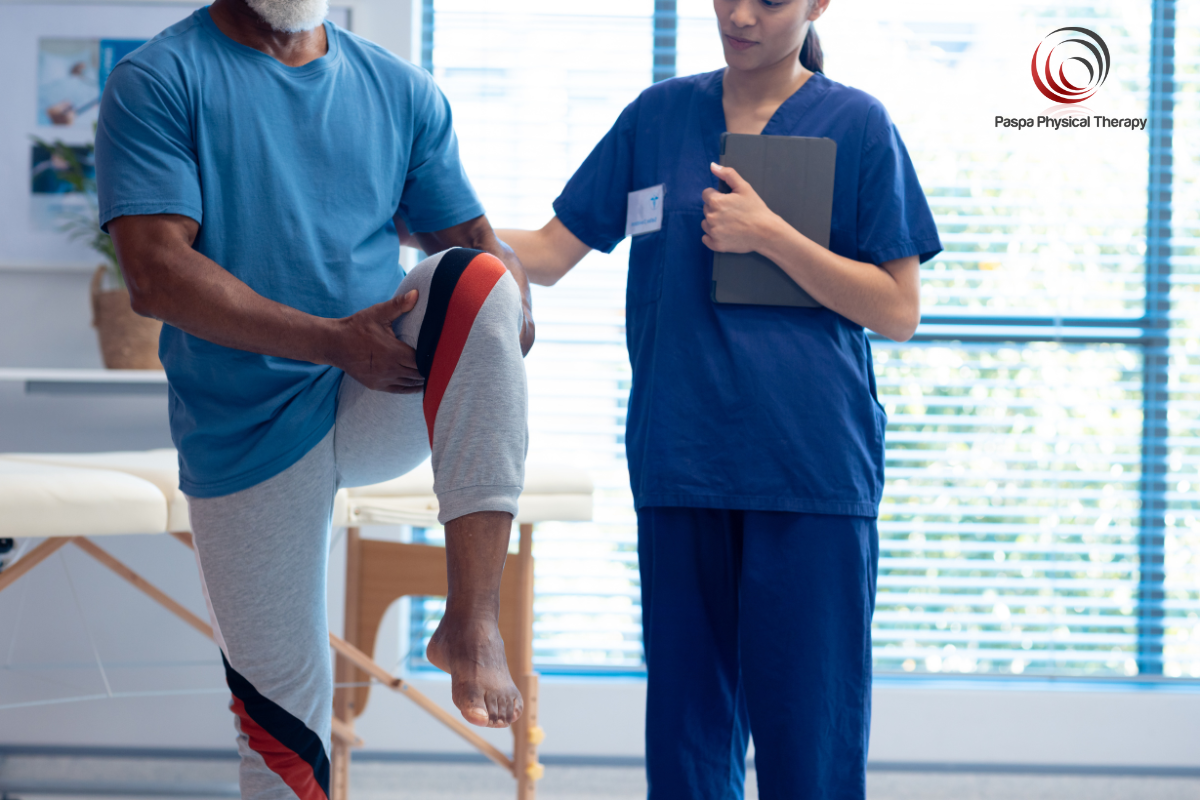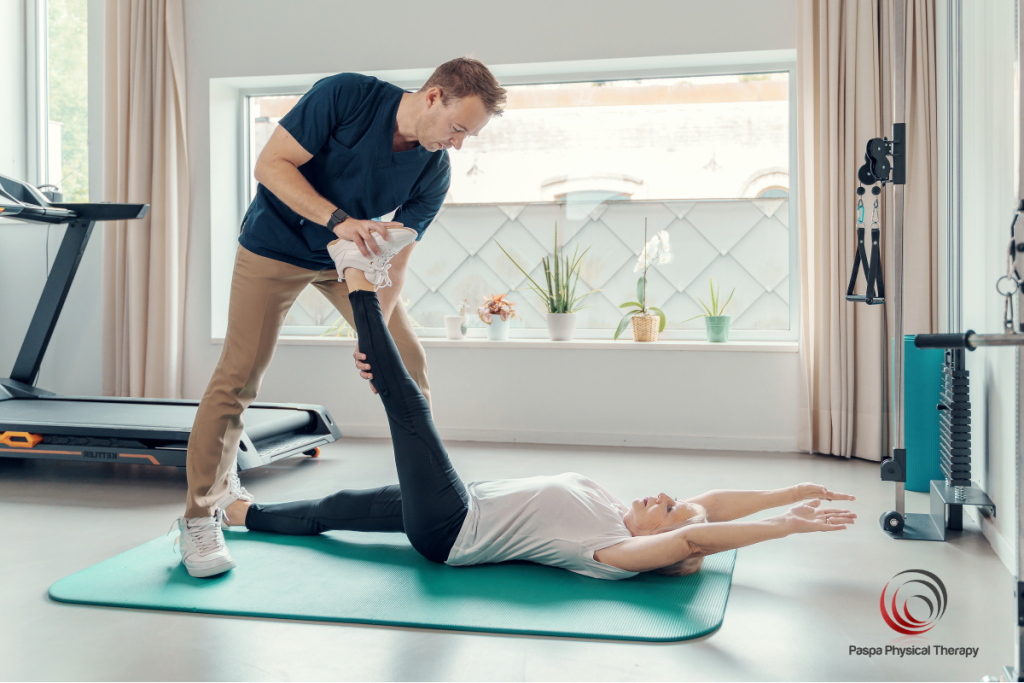Patellar Tendonitis

Knee pain can sideline anyone from their favorite activities, whether it’s running, playing sports, or simply climbing stairs. One of the most common culprits of persistent knee pain is patellar tendonitis, also known as jumper’s knee, a condition that affects athletes and active individuals alike.
At Paspa Physical Therapy, we specialize in one-on-one care tailored to each patient’s needs. Located in Manhattan, New York, our experienced physical therapists offer personalized treatments in private rooms and a fully equipped gym. Call us today to get started on your path to recovery.
What is Patellar Tendonitis?
Patellar tendonitis is an overuse injury that affects the tendon tissue connecting your kneecap (patella) to your shinbone (tibia). This tendon plays a critical role in helping your quadriceps muscles extend the knee, allowing you to straighten your leg, jump, and run. When overused or stressed beyond its capacity, the tendon can develop small tears, leading to inflammation, pain, and weakness.
Often referred to as jumper’s knee, patellar tendonitis is especially common among athletes involved in jumping sports such as basketball, volleyball, and figure skating. But it can also affect non-athletes engaged in regular physical activity or those with biomechanical imbalances that place stress on the patellar tendon.
What Causes Patellar Tendonitis?
Overuse is the most common cause of patellar tendonitis. Repeated stress from activities like jumping, sprinting, or even prolonged walking or running can lead to degeneration and tearing of the tendon fibers. These small tears trigger the body’s healing response, resulting in pain, swelling, and reduced function.
Other contributing factors include:
- Weak quadriceps strength or imbalances in the thigh muscles
- Tight hamstrings or calf muscles
- Sudden increase in physical activity
- Inadequate warm-ups or poor conditioning
- Poor landing mechanics during jumps
- Poor footwear or hard playing surfaces
Athletes who do not allow adequate healing time between intense workouts or those returning too soon from a sports injury are at higher risk of developing patellar tendonitis.
Patellar Tendonitis Symptoms
Common symptoms of patellar tendonitis include:
- Pain and tenderness at the bottom of the kneecap
- Swelling around the patellar tendon
- Discomfort when bending the knee, especially with knees bent under load (like climbing stairs or squatting)
- Pain that worsens with activity and improves with rest
- Stiffness in the knee after sitting or upon waking
- Weakness in the quadriceps
If the condition worsens without treatment, it can lead to a patellar tendon tear, which may require surgery.
How is Patellar Tendonitis Diagnosed?
A physical exam is typically the first step. Your healthcare provider or physical therapist will evaluate the knee for tenderness, swelling, range of motion, and strength. They may ask you to perform movements that recreate your symptoms.
In some cases, imaging studies like ultrasound or MRI may be used to confirm the diagnosis or rule out a patellar tendon tear or other sports injuries.
At Paspa Physical Therapy, we take time to fully assess each patient’s symptoms and functional limitations through a thorough one-on-one evaluation in a private treatment room. This careful attention helps us create an effective and personalized recovery plan.

How to Treat Patellar Tendonitis
Treatment typically depends on the severity of the condition. During the acute phase, the goal is to reduce inflammation and swelling. Effective strategies include:
- Rest from aggravating activities
- Ice therapy
- Anti-inflammatory medications
- Supportive taping or bracing
- Gentle stretching
Once pain begins to subside, physical therapy becomes essential to rebuild muscle strength, correct biomechanical issues, and return safely to sport. In more severe cases, regenerative treatments or surgery may be necessary.
At Paspa Physical Therapy, we provide expert one-on-one care that focuses on progressive tendon healing, not just symptom relief. You’ll work directly with experienced physical therapists, not aides or trainers.
How to Prevent Patellar Tendonitis
Prevention starts with understanding your body’s limits and taking proactive steps:
- Strengthen quadriceps, hamstrings, and calf muscles
- Warm up properly before activity
- Avoid sudden increases in training intensity or duration
- Practice proper landing techniques
- Stretch regularly to maintain flexibility
- Use proper footwear for your sport
Our team at Paspa Physical Therapy collaborates with patients to develop personalized prevention programs tailored to their specific goals and lifestyle.
Patellar Tendonitis Exercises
Exercises play a vital role in managing and recovering from patellar tendonitis. Some effective options include:
- Isometric quad sets: Tighten the thigh muscles with the knee straight for 5–10 seconds
- Straight leg raises: These strengthen the quadriceps without stressing the patellar tendon
- Step-ups: Begin with a low start position and increase height gradually
- Eccentric squats: Slowly lower into the squat position with control to build tendon strength
- Wall sits: Build muscle endurance by holding the squat with knees at 45–60 degrees
These exercises should be performed under the guidance of a skilled physical therapist to ensure correct form and progression. Paspa Physical Therapy provides supervised rehab programs in our full gym to help patients regain full function within six weeks to a few months, depending on the severity of the injury.
Get Expert Care for Patellar Tendonitis Today
If you’re struggling with patellar tendon pain or recovering from a sports injury, don’t wait to seek help. The earlier you begin treatment, the better your chances of full recovery without long-term complications.
Paspa Physical Therapy in Manhattan offers individualized, one-on-one care from experienced therapists in a comfortable, fully equipped environment. Call us today to schedule your evaluation and take the first step toward healing.
Our Services
Condition and Injuries We Treat
